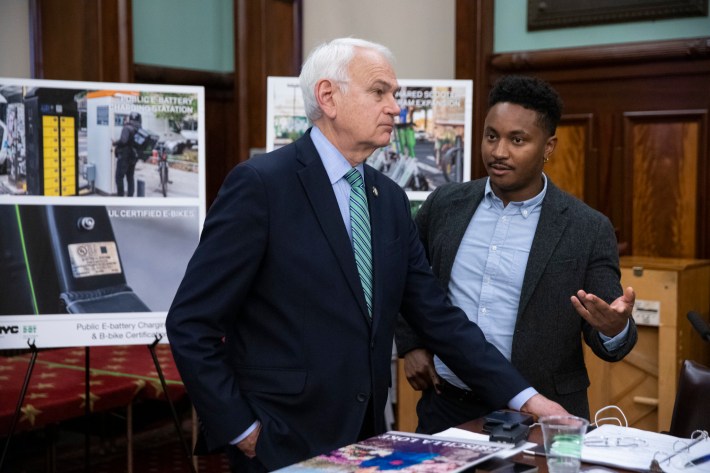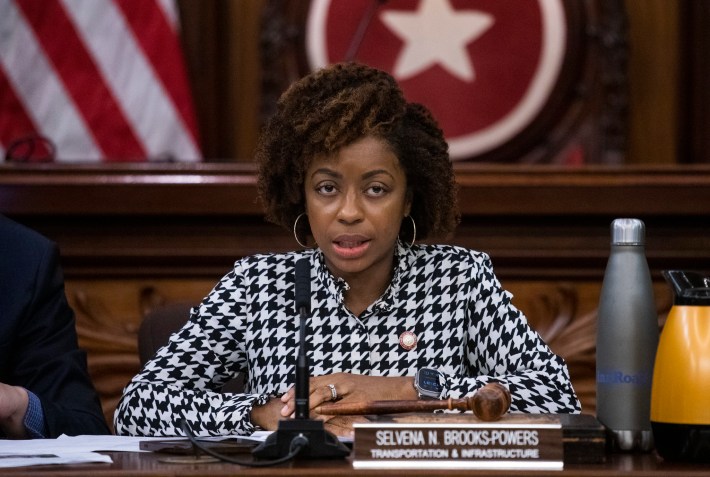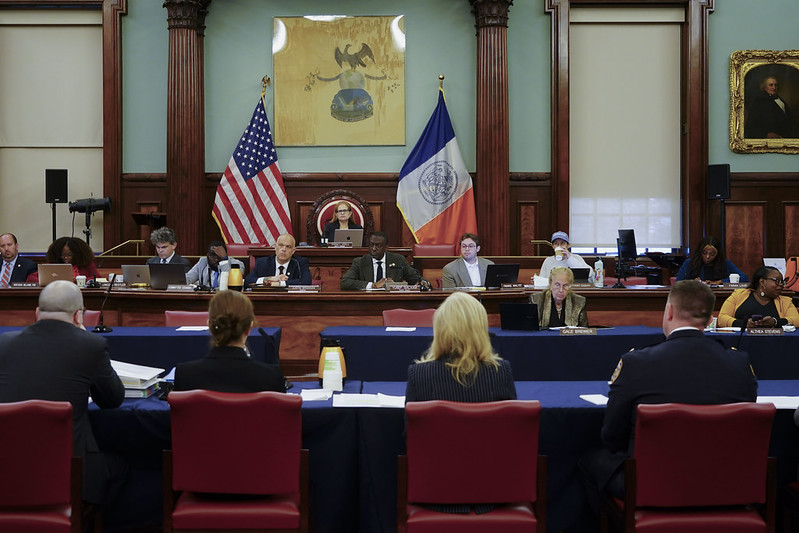She manufactured a crisis — and now she wants a solution.
NYPD Commissioner Jessica Tisch told City Council members on Wednesday that her push to criminalize low-level traffic violations by cyclists is the result of regular tickets being “virtually meaningless" because e-bikes are unlicensed.
In doing so, Tisch created a pretext – with no data to back it up – that only has one backwards solution: e-bike licensing.
On Thursday, members of the Council’s committees on Finance and Public Safety used an oversight hearing as a chance to grill Tisch about the new bike policy — which swaps regular traffic tickets for criminal summonses for such violations as passing through a red light. And Tisch was nothing if not consistent in her answer, repeating time and again that criminal summonses are the only option until the Council gives her a different enforcement regime.
“I am eager to work with this Council on a legal framework, a new enforcement paradigm for e-bikes in New York City. In fact, I call on this Council to change the laws as they relate to e-bikes in this city,” said Tisch. “But under the current law we had two options: one was B summonses [traffic tickets] and one was [criminal] summonses. As it relates to e-bike enforcement, for vehicles without licenses, B summonses do not work, they are meaningless.”
But the Commissioner has failed to provide the public any data showing that cyclists (e-bike and otherwise) who were given traffic tickets weren’t paying them — the stated rationale for the criminalization push.
And Tisch has previously said the policy she rolled out on April 28 was "data driven," but new stats obtained by Streetsblog show that there was a dramatic decrease in e-bike-caused crashes and pedestrian injuries between Jan. 1 and April 30 this year compared to the same period in 2024.
Creating two choices
Before Tisch started directing cops to give out criminal summonses to e-bike riders (and other cyclists) as a part of a quality-of-life pilot program, the Council had been stalling legislative action around e-bikes and the delivery industry, which puts the most e-bikes on the road.
Council Member Bob Holden’s Intro 606, which seeks to require the city Department of Transportation to license all e-bikes, had a contentious hearing last year. But even with 28 sponsors, it hasn’t moved. The DOT opposes it.

Mayor Adams has long said he would create a “Department of Sustainable Delivery,” and even leaked a draft bill that would reign in the app industry, but the Council has stalled that effort, too.
Into that vacuum of leadership swept Tisch and her criminalization push, which many Council Members oppose. Even Transportation Committee Chair Selvena Brooks-Powers, a centrist Democrat from Southeast Queens, questioned the escalation.

“I just wanted to underscore the concern about cyclists being given criminal violations for infractions, which is not what motorists get,” she told the Commissioner on Thursday. "I recognize that there is a need for greater enforcement because there is a degree of what the public has felt is lawlessness, but I don’t know if giving criminal citations is the way to go."
Each time a Council member broached the question of whether criminalization was fair in light of the fact that car drivers are still only receiving traffic citations, Tisch teed up her call for registration on e-bikes.
“The current framework just doesn’t make sense and doesn’t work. We have had the proliferation of e-bikes in New York City without the change in regulatory framework,” Tisch said. “These e-bikes in New York City are not licensed, therefore there is no bite. When you talk about a mode that is not licensed, the B summons is meaningless,” she responded to another.
There is no evidence that normal traffic tickets is "meaningless" as an enforcement strategy.
“The Commissioner provides no data to support her claims of recidivist cyclists declining to pay moving violations,” said Chris Greene, an attorney with the bike focused firm Vaccaro Law. "And ICE is scooping up New Yorkers from courthouses. ... Does [Tisch] expect that this population of recidivist cyclists, which she insists exists, will now be willing to physically appear in criminal court to address a minor traffic violation?
'Consequence-free existence'?
The commissioner continually testified that before her NYPD began giving out criminal summonses there were no consequences for cyclists who broke the rules.
“My opinion generally is that we cannot live in a consequence-free environment, bad things come from that. E-bikes were living in a consequence free environment,” she said in response to a question from Council Member Lincoln Restler (D-Williamsburg).
But there were consequences in the form of expensive tickets — $190 for running a red light. Such tickets were the result of a concerted effort from city lawmakers a decade ago to move the NYPD away from criminal ticketing of such offenses as jaywalking in order to have fewer people dragged into the criminal justice system for non-violent crimes.

A year after 2016 law passed, there was a 90-percent drop in criminal summonses.
Progressives say the Adams era, and Tisch’s “Q-Team” pilot program, is a step back. From the beginning of the Adams administration, cops have dramatically stepped up issuing criminal summonses across the board: A 91-percent increase for drinking in public, a 1,360-percent increase for biking on the sidewalk, and a 233-percent increase in criminal summonses for fare evasion.
“I thought that the [2016] criminal justice reform act was a really positive thing,” Restler said. “We gave the NYPD the discretion to shift to civil enforcement from criminal enforcement. Now in the Adams administration we are seeing significant increases towards criminal summonses instead of civil ones.”
A leadership vacuum and the third choice
After failing to regulate app companies with his Department of Sustainable Delivery, Mayor Adams has shifted gears. Where once the administration sought to overhaul the delivery industry and make streets safer and more orderly, there is now Commissioner Tisch not even mentioning the delivery work rules that discourage safety, instead repeating that the criminalization push will continue until the Council licenses e-bikes, even saying she wanted to expand the push citywide.
"We are doing a [criminalization] pilot now in six precincts, with the intent of learning about that pilot," said Tisch. "The intent of this program is to go citywide. I believe we will be able to take it citywide expeditiously and I look forward to announcing soon a schedule for that."






